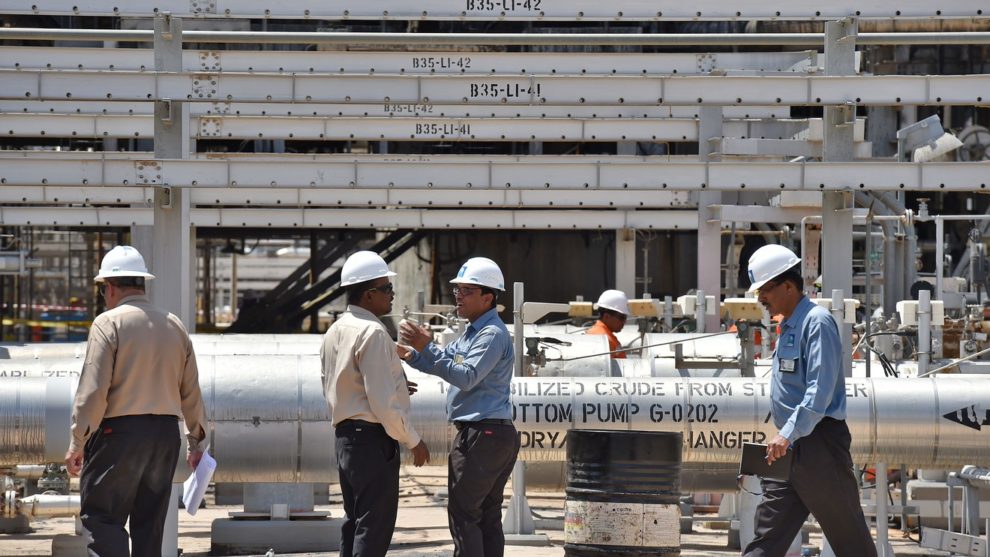
Oil futures finished lower on Friday, but registered a sharp gain for the week, their largest in months, after attacks on Saudi Arabian production facilities last weekend raised concerns over the amount of spare capacity in the oil market.
As the Saudis “reveal the extent of damages, the market mood has shifted to questioning how quickly production can be restored,” Manish Raj, chief financial officer at exploration and production firm Velandera Energy Partners, told MarketWatch. “We are familiar with the repair and maintenance processes in oilfield services, and the damages appear to be far worse than what can be restored within a matter of a few days.”
Oil pared gains seen on Monday, when futures jumped nearly 15% in the aftermath of weekend attacks, which Washington and Riyadh have blamed on Iran, that shut down half of Saudi Arabia’s daily oil production. Saudi officials on Tuesday subsequently said they were on track to restore production by month end.
But reports that Saudi Arabia has moved to import substantial amounts of crude from its neighbors as it scrambles to maintain export commitments and maintain market share has underlined concerns that the country, viewed as the primary source of spare capacity in the global market, would be unable to respond to any further shocks.
Read: ‘Tight quarters of the Persian Gulf’ help raise spare oil capacity concerns
West Texas Intermediate crude for October delivery CLV19, -0.07% fell by 4 cents, or 0.07%, to finish at $58.09 a barrel on the New York Mercantile Exchange, with the contract logging a 5.9% weekly advance, the biggest for the U.S. benchmark since the week ended June 21, according to Dow Jones Market Data. The October contract expired at the end of the session.
November WTI CLX19, +0.19% which is now the front month, shed 10 cents, or 0.2%, to settle at $58.09.
The global benchmark, November Brent crude BRNX19, +0.30% lost 12 cents, or 0.2%, to $64.28 a barrel on ICE Futures Europe and marked a 6.7% weekly advance — the largest since January.
“We have been cautious on price and our current Brent forecast for 2020 is $59 a barrel. However, it is unprecedented for the crude market to lose over 5 million barrels a day of production in a day, and while the duration may prove short, the incidents at Abqaiq and Khurais demonstrate the vulnerability of supply if hostilities in the Middle East escalate,” said Jason Gammel, analyst at Jefferies, in a note. “We would thus expect oil prices to reflect a heightened political risk premium.”
Meanwhile, the longer term impact of the attacks is still difficult to judge because Saudi officials are likely to play down potential problems due to concerns about customer relations and the planned initial public offering of state-owned oil company Saudi Aramco, said Eugen Weinberg, commodity analyst at Commerzbank, in a note.
Velandera’s Raj said it would be “foolish for Aramco to push ahead with its IPO in this environment amidst substantial geopolitical concern, lack of confirmation of air defenses being in place to deter future attacks, and lack of confirmation that all damages have indeed been restored.”
Looking ahead to next week, Raj said the market will “eagerly await” more information about restoration of Saudi production capacity.
Meanwhile, data form Baker Hughes BHGE, +0.49% Friday revealed a fifth straight weekly decline in the number of active U.S. rigs drilling for oil, suggesting a further slowdown in production.
Separately, October gasoline futures RBV19, -1.16% fell 1.3% to $1.6784 a gallon, but prices gained 8.1% on the week. A rally Thursday lifted prices by 2.6%—inspired by flooding in Texas that shut down units at Exxon Mobil Corp.’s XOM, -0.60% Beaumont petrochemical plant. The temporary threat to refineries raised concerns about motor fuel supplies while putting pressure on crude in Thursday’s session on expectations for reduced demand.
“Texas flooding is concerning, but the market has largely discounted the effects, although new information about extended damages may change short-term pricing,” Raj said.
In other energy trading, October heating oil HOV19, -0.44% fell 0.9%, to $1.9863 per million British thermal units, ending 5.8% higher for the week. October natural gas NGV19, -0.16% fell 0.2% to $2.534 per million British thermal units, for a weekly loss of 3.1%.











Add Comment